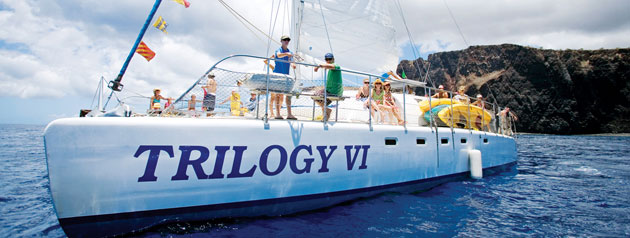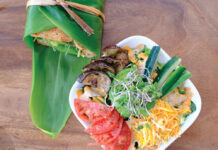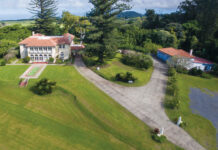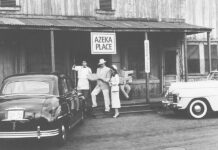Story by Sky Barnhart | Photography courtesy of Trilogy Excursions
 “Honey, I’ve lost the Mañana,” Eldon Coon told his wife over the phone from a secluded cove near Ketchikan, Alaska.
“Honey, I’ve lost the Mañana,” Eldon Coon told his wife over the phone from a secluded cove near Ketchikan, Alaska.
“What do you mean, ‘lost it’?” Jeannette Coon asked in disbelief. How does a sixty-two-foot luxury yacht just disappear?
The night before, an extremely low tide in the cove had exposed a razor-sharp, abandoned piling that dug into the Mañana’s hull, sinking her in thirty feet of water. The loss left the Coon family without what had been their second home, center of recreation and major source of income for more than two decades.
Eldon decided an opportunity now lay before him, a chance to fulfill his lifelong dream of building a boat and sailing the South Seas. The Coons recruited their grown sons, Jim and Rand, to join them and teenage sister Pattie in Seattle. There the family built a fifty-foot sailing trimaran, which they christened Trilogy. It was an all-consuming effort and a huge leap of faith—especially when they sold the house and set sail for foreign ports—but hard work and faith had always been how the family functioned.
Like his seafaring father, Meade Coon, Eldon was known to quote the proverb: “In all thy ways acknowledge Him, and He shall direct thy paths.” Jim recalls his dad sitting at the kitchen table, designing how many barrels of diesel he would need to get to Maui, a place he had always felt drawn to.
The family sailed together on Trilogy for almost two years, to Mexico, Central and South America, the Galapagos Islands, the Marquesas, and finally to Hawai‘i. Needing to replenish funds for the next leg of their around-the-world journey, Eldon decided to start a charter service between Lana‘i and Maui. Other companies had tried and failed over the years, but the Coons did something no one else had: they asked Lana‘i kupuna (elders) for their blessing. Residents agreed on one condition: that the company not bring visitors to Hulopo‘e Beach on weekends and holidays, the only time locals had to enjoy their beach.
That was almost thirty-eight years ago, and despite Lana‘i’s shift from a plantation economy to one based on tourism, Trilogy Excursions still honors that agreement.
Add to that an unshakable work ethic and commitment to customer service, and it’s not hard to see why Trilogy Excursions has become a fixture at the top of Maui’s ocean-activities industry. The company has been voted Best on Maui by The Maui News Readers Poll year after year, and—most dear to the heart of Trilogy CEO Jim Coon—in 2008, the company won the Living Reef Award for its commitment to conservation.
Today, Trilogy runs Lana‘i excursions five days a week on six catamarans, and is one of the largest employers on the privately owned island. Although the company has had to cut Maui staff because of the troubled economy, Jim says they’ve done their best to keep everybody on Lana‘i, where options for employment are limited.
That’s not the only reason Trilogy is a household name on Lana‘i. Each Thanksgiving, the company gives a turkey to every family on the island—1,000 turkeys last year! Trilogy also brings representatives from environmental protection, human services, and educational agencies to provide information and benefits to residents. “In one day, [the agencies] are able to reach out and touch the entire community,” Jim says.
To marine biologist Hannah Bernard, president and cofounder of the Hawai‘i Wildlife Fund, Trilogy represents corporate responsibility at its best. “They put people first. They support their community, and they’re sensitive to the rural lifestyle Lana‘i enjoys. They’ve retained their family flavor, that sense of taking friends out for a good time.”
In every voyage, the Coons aim to replicate the idyllic days of their own South Sea voyages, relaxing on the boat, swimming and diving, cooking up a big barbecue lunch and talking story. In her book, Trilogy: A Family’s Voyage of Faith, Jeannette describes some of the meals she created in the cozy galley—origins of the Trilogy Chicken and Mom Coon’s Famous Cinnamon Rolls served on every voyage.
Bernard appreciates the company’s decision to stay with smaller vessels, rather than supersizing to max out passenger capacity. “And they really sail,” she says. “The masts are not just for decoration”—which translates into a smaller footprint on the environment.
On a recent sail to Lana‘i, Captain Brian Richard stops the boat halfway across the channel when a crewmember spots a “whale egg”—a Nerf football floated out to sea. A scoop with a bucket, and the rubbish is removed from the ocean, winning applause from all onboard.
Through a partnership with the Hawai‘i Wildlife Fund, many Trilogy crewmembers have completed naturalist training about the Islands’ unique marine life and environment, and use that training to educate the public.
“When we started, there were no environmental rules,” Jim says. “People anchored in the coral, threw their garbage in the water, broke off coral to take home; it was a free-for-all. . . . So when a new person would enter the charter business, we’d have lunch with them and say, ‘Here’s the deal: We need the environment to stay pristine. We take pictures and leave bubbles.’ People said, ‘That makes sense.’”
Trilogy was the first company to pump out its treated waste at onshore facilities rather than dumping it in the ocean. The company is active in efforts to install and maintain day-use moorings, which eliminate the need for vessels to anchor and inadvertently damage coral. Not satisfied with semiannual reef cleanups, Trilogy captains recently created the Blue ‘Aina program, which focuses on a different reef every month.
“We’re out on the water every day, so we just said, ‘Hey, what can we do?’” says Captain Brian, who’s sailed with Trilogy for eight years. With the crew volunteering their time, and Trilogy donating boats and equipment, the program takes forty to fifty volunteers out to clean up the reefs from beach to surf zone. Participants donate $10, and all proceeds benefit the Maui Reef Fund and the Surfrider Foundation.
Over the years, Trilogy has expanded its offerings to include popular snorkel cruises to Molokini; Ka‘anapali sunset sails and whale watches; even O Pa‘ani Kai, a half-day of ocean activities like kayaking, stand-up paddling, snorkeling and sailing. Jim’s daughter LiAnne and Rand’s daughter Lily both work for Trilogy, and have been instrumental in bringing in large groups, weddings and customized events.
Aside from a lifelong affinity for native peoples and languages (fostered by years of world travel), and the fact he and Rand both married island girls, Jim recognizes the value of Hawaiian culture as an integral part of sustainable tourism.
“You can have mai tais on the beach in other places in world, but you can’t have Hawaiian culture,” he says. “Here you had a culture that lived in harmony with the environment, from the ahupua‘a management of land resources, to lokahi [working together], to po‘okela [striving for excellence], to ‘imi loa [seeking knowledge].”
Trilogy often brings in cultural practitioners to help the crew understand traditional Hawaiian values and practices. While crewmembers would never profess to be experts, they still hope to integrate a sense of the culture and a true feeling of aloha into their guests’ experiences.
Then there’s the Hawaiian value of ‘ohana so fundamental to the Coons’ business practices. “In a family business, you tend to look at your employee base as extended family,” Jim says. “The same values that let a family function well will also let a business function well.”
This year, the Coons celebrate 122 years of brothers in business together—a tradition that began in 1888, when Frank, Austin and Meade Coon established one of the first holistic health sanitariums in Washington State; and continued into the next generation, when Eldon and his brother Afton built a fishing boat and sailed it to Alaska. Jim and Rand took over Trilogy operations after Eldon’s passing, and anticipate a new generation that will include cousins and daughters, as well. Besides LiAnne and Lily in marketing, Jim’s son Riley and Rand’s son Denver are involved in operations, working on the boats and studying to get their captain’s licenses.
“The family business is an opportunity for the kids, but it’s not an obligation,” Jim says. He encourages them to follow their own dreams and make their own successes, just as their grandparents and great-grandparents did.
Meanwhile, he and Rand are drafting a family constitution of how Trilogy should be run in the future. “As years eventually will phase us out of this, how do we set up a structure that will let the next generation operate?”
It’s a safe bet that listed somewhere on that document will be one firm rule: no Hulopo‘e Beach on weekends.






Mahalo Coon brothers and OHANA.